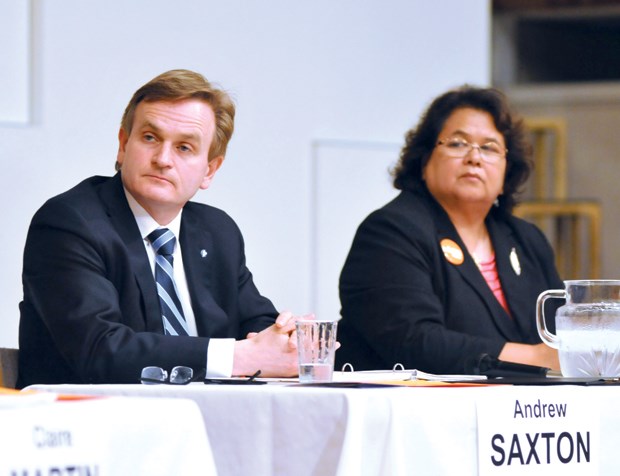Like weary boxers looking to land one last haymaker before the bell, North Vancouver’s six federal candidates rebutted, refuted and repudiated each other one final time in a two-hour debate Wednesday.
Highlands United Church was packed past capacity as undecideds and very-firmly-decideds lobbed inquiries and incendiaries in an attempt to suss out the riding’s best representative.
Independent candidate Payam Azad was the first to pound the pulpit as he decried the high cost of medicine in Canada – a cost he said has resulted in thousands of deaths.
“If we put a universal medicine plan in place in Canada, it is going to even cost less ... than the status quo,” he promised.
Another cost Canadians should be wary of bearing involves the Trans-Pacific Partnership, a trade agreement that is a “double whammy of bad news,” according to Green candidate Claire Martin.
Signing on to TPP will mean paying off inevitable lawsuits, as the deal would force Canada to either break its own environmental laws or fail to live up to the contract, according to Martin.
“Hilary Clinton – and I’m not a fan – but when Hilary Clinton says it’s a bad deal for the U.S., I think Canada should take a second look,” Martin said.
NDP candidate Carleen Thomas concurred.
When asked about the possibility of party leader Tom Mulcair ripping up the TPP, she pointed to communities being devastated by lost mill and cannery jobs as a result of previous free trade agreements.
There needs to be full disclosure as well as “an understanding that we’re impacting families,” Thomas said.
While moderator Adrian Chaster was largely successful in limiting cheers and jeers during the debate, the emotional audience became increasingly vocal when incumbent Conservative Andrew Saxton duelled with Liberal Jonathan Wilkinson.
Responding to a question about how the Conservatives would assure stability in the event they won a minority government, Saxton assured the crowd the NDP and Liberals were on the brink of a backroom partnership.
“The Liberals and the NDP will be at it again ... they’re going to try to put together a coalition,” he said.
Most Western countries function with coalitions, Wilkinson responded.
“To say that there is something inherently wrong about parties collaborating for the purpose of developing public policy just strikes me as bizarre,” he said.
Each candidate was given three wild cards in the event they wanted to answer a question asked of another politician. Both Wilkinson and Saxton burned wild cards in a debate about debt.
“There is a big difference between going into a deficit when times are bad rather than going into a deficit when times are good,” Saxton said, deriding Liberal leader Justin Trudeau’s fiscal plan.
Trudeau will scrap tax breaks, do away with income splitting, raise taxes, and still either run into debt or break campaign promises, according to Saxton.
Wilkinson reached for a wild card shortly after Saxton said Canada spent 20 years recovering from Pierre Trudeau’s economic missteps.
Wilkinson blasted the Conservatives for turning a $13.8-billion surplus – the fruits of Liberal governments – into a deficit.
Approximately 80 per cent of the debt created during “any of Canada’s history” can be attributed to governments led by Conservative Prime Minister Stephen Harper and former prime minister Brian Mulroney, according to Wilkinson.
While the crowd cheered, Saxton put down his own wild card.
“We believe that if you have run a surplus, that means you’re over-taxing Canadians,” Saxton said.
The Liberal surplus was built by “raiding the (employment insurance) fund of $60 billion” and essentially using it as a “slush fund,” Saxton said, drawing cheers from his supporters.
While many politicians made big promises, Libertarian candidate Ismet Yetisen tempered expectations.
“Even if I win, most likely I have nothing to offer,” he said. “I’m not a David Suzuki, I cannot change the climate. I cannot bring down the house prices.”
However, Yetisen assured the crowd, many of whom chortled during his opening statement, that he wouldn’t forsake his constituents. “If I win, you can call me anytime and come have a free coffee,” he said.
Yetisen advocated for a less powerful Prime Minister’s Office.
Discussing Turkey, he noted the “president wants to be a king;” a situation that isn’t entirely foreign to Canada, according to Yetisen.
“The honest way that I see, this country is a kingdom as well.”
Unless Canada makes sweeping changes, the power of the state will continue to escalate, according to Azad.
The independent characterized recent anti-terrorism legislation as having: “absolutely nothing to do with security and absolutely everything to do with suppression of dissent.”
As the country moves forward, the first-past-the-post voting system needs to be left in the past, said Martin.
A new voting system could lead to greater representation and more voters showing up at the polls, according to the Green candidate.
“Can you imagine having an MP that you respect, you like, you trust?” Martin asked. Sitting just a few seats away, Saxton nodded enthusiastically.



